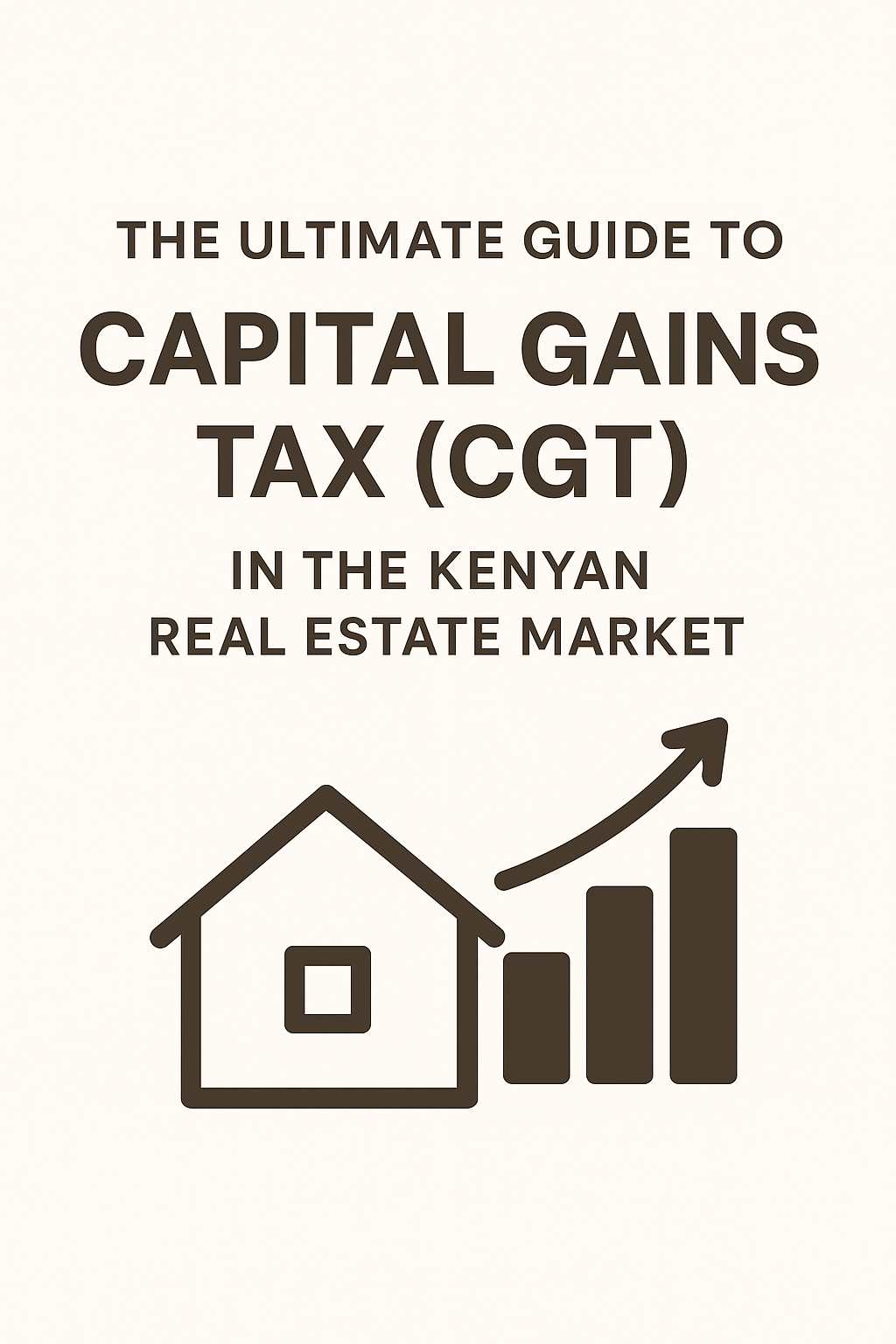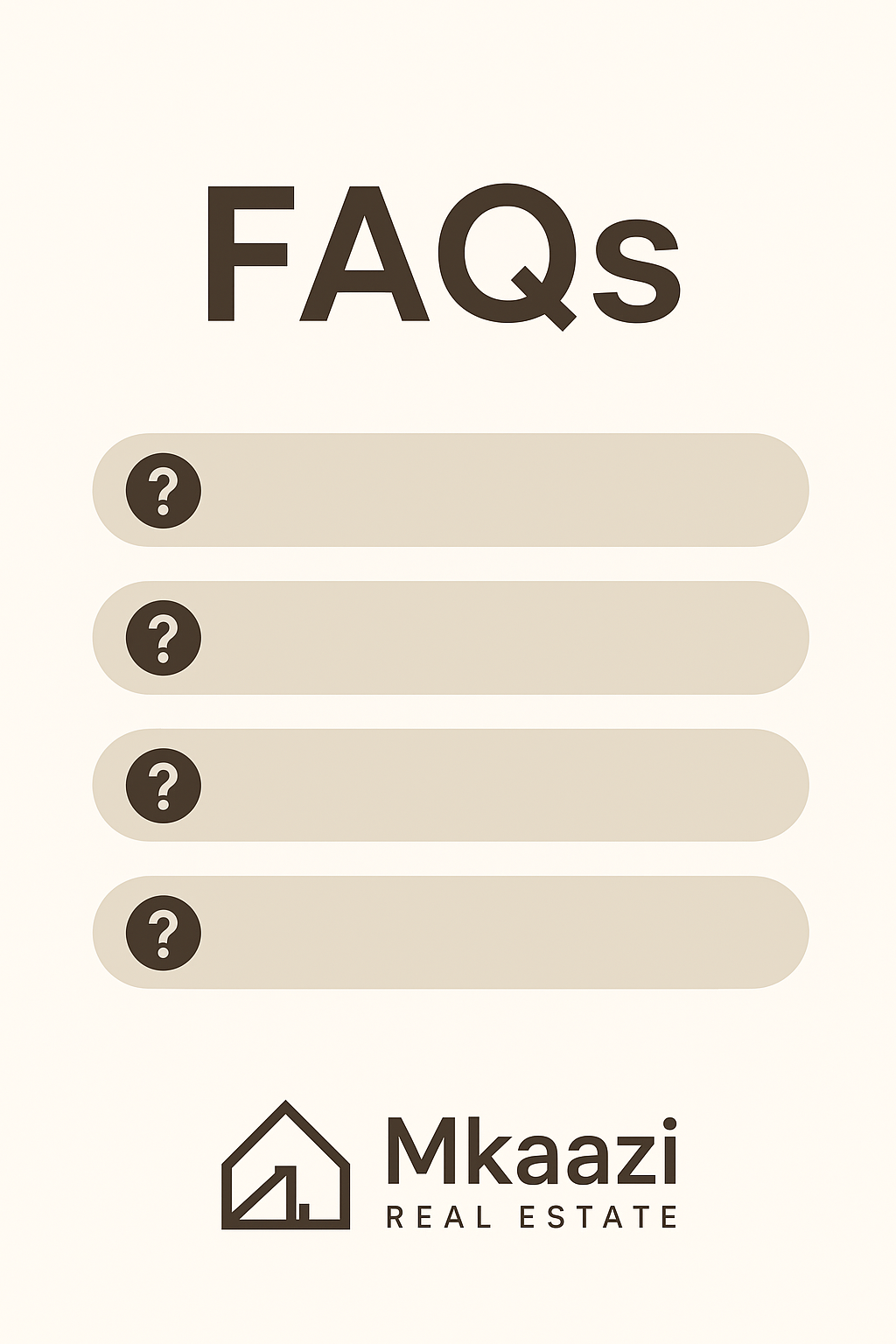Why Understanding Capital Gains Tax Matters
Introduction:
Real estate is one of the most attractive asset classes in Kenya. From the buzzing urban centers of Nairobi and Mombasa to serene beach towns like Watamu and Malindi, property ownership is both a source of pride and wealth creation. For many families, land and homes represent intergenerational security and the most enduring form of investment.
Yet, many Kenyan property owners and diaspora investors underestimate the impact of taxes on their real estate journey. One of the most significant — and sometimes confusing — taxes is Capital Gains Tax (CGT).
CGT has had a checkered history in Kenya. Initially introduced in 1975 under the Income Tax Act (Cap 470), it was suspended in 1985 to stimulate property investment. However, it was reinstated in January 2015, and today it plays a crucial role in Kenya’s revenue framework.
For property owners and diaspora Kenyans remitting funds home to buy or sell real estate, misunderstanding CGT can lead to unnecessary penalties, compliance issues, or even missed opportunities for tax planning.
This guide provides a comprehensive, practical, and easy-to-read breakdown of Capital Gains Tax in Kenya’s real estate market, complete with examples, legal references, case studies from different regions, and answers to frequently asked questions.
1. What is Capital Gains Tax (CGT) in Kenya?
Capital Gains Tax is a tax levied on the profit (gain) made when selling or transferring property. It is charged under the Eighth Schedule of the Income Tax Act, Cap 470.
Unlike income tax (which applies to salaries, business profits, and rentals), CGT only applies when you dispose of an asset. A disposal can include:
- Selling a piece of land or building.
- Transferring ownership through an exchange.
- Gifting property (in some cases).
- Compulsory acquisition by government.
How CGT is Calculated
The formula is straightforward:
Capital Gain = Transfer Value – (Acquisition Cost + Incidental Costs)
Where:
- Transfer Value is the amount you receive from selling the property.
- Acquisition Cost is what you originally paid for the property (or the market value at inheritance).
- Incidental Costs include legal fees, stamp duty, valuation fees, and agent commissions.
CGT is then charged at 15% of the net gain.
📌 Example (Nairobi):
If you bought an apartment in Kilimani for Ksh 12M in 2018 and sold it for Ksh 20M in 2025, and you spent Ksh 1M in legal fees, agent commission, and stamp duty:
- Transfer Value = 20M
- Acquisition Cost = 12M
- Incidental Costs = 1M
- Net Gain = 7M
- CGT = 15% of 7M = Ksh 1.05M
2. The Current Rate of CGT in Kenya
As of January 2023, the CGT rate in Kenya is 15% (up from 5% previously). This change was made under the Finance Act 2022 to align Kenya with global tax standards and boost government revenue.
For comparison:
- Tanzania levies CGT at 10% for residents and 20% for non-residents.
- Uganda charges CGT under income tax at 30% for corporations.
- South Africa has varying rates depending on income brackets.
Thus, Kenya’s rate is regionally competitive, though higher than before.
3. CGT and Inherited Property
One of the most common questions asked by Kenyans both locally and abroad is: “Do I pay CGT when I inherit land or property?”
Inheritance Transfers
The answer is No. Property inherited through succession is exempt from Capital Gains Tax under Section 34(3)(a)(i) of the Income Tax Act. The law recognizes that inheritance is not a commercial disposal.
When You Sell Inherited Property
However, if you later sell the inherited property, CGT becomes payable. The acquisition cost is usually the market value at the date of inheritance (probate value).
📌 Example (Kilifi):
You inherit a beachfront plot in Watamu valued at Ksh 30M in 2020. In 2024, you sell it for Ksh 45M.
- Acquisition Value = 30M
- Sale Price = 45M
- Gain = 15M
- CGT = 15% of 15M = Ksh 2.25M
Practical Tip
Always ensure a professional valuation is done at probate so that the acquisition cost reflects true market value. This minimizes taxable gain later.
4. CGT vs Stamp Duty: Understanding the Difference
Many property owners confuse CGT with stamp duty, but they are fundamentally different.
| Aspect | Capital Gains Tax (CGT) | Stamp Duty |
|---|---|---|
| Who Pays | Seller of the property | Buyer of the property |
| When Due | On disposal (sale/transfer) | On transfer/registration |
| Rate | 15% of net gain | 4% urban / 2% rural |
| Collected By | Kenya Revenue Authority (KRA) | Ministry of Lands |
📌 Example (Kisumu land sale):
If you sell a Ksh 5M plot in Kisumu at a gain of 2M, the seller pays CGT of Ksh 300,000.
The buyer pays stamp duty of 2% (if rural) or 4% (if urban), i.e., Ksh 100,000 or 200,000.
5. Exemptions and Special Cases
Not all property transactions attract CGT. Some common exemptions include:
- Private Residences – If you sell your primary home, CGT is exempt provided you’ve lived there continuously for 3 years prior to disposal.
- Agricultural Land <50 Acres – If located outside municipalities and townships.
- Transfers Between Spouses – Includes divorce settlements.
- Compulsory Government Acquisition – Compensation is exempt.
- Transfers to Charitable Organizations – If registered.
📌 Example: Selling a 30-acre farm in Bungoma to your son is exempt if it’s family succession.
6. How to Pay CGT in Kenya
Paying CGT involves filing through KRA’s iTax system within 30 days of transfer completion.
Process:
- Log into KRA iTax.
- Generate a CGT return under the “Capital Gains” tab.
- Provide transaction details (sale price, acquisition cost, costs).
- Upload supporting documents (sale agreement, title deed, valuation report, receipts).
- Generate payment slip and pay via M-Pesa Paybill 572572 or bank.
Penalties
- Late filing penalty: Ksh 2,000 or 5% of tax due.
- Interest: 1% per month.
7. Regional Case Studies
Nairobi (Urban Apartments)
A Westlands apartment bought for Ksh 15M in 2016 sold for Ksh 25M in 2025. Net gain = 10M. CGT = 1.5M.
Kisumu (Land near CBD)
Bought at 2M in 2010, sold at 8M in 2024. Gain = 6M. CGT = 900,000.
Malindi/Watamu (Beachfront plots)
Inherited at 20M in 2018, sold at 35M in 2023. Gain = 15M. CGT = 2.25M.
Diaspora Case
A Kenyan living in London sells a Nairobi apartment through a lawyer. They must file CGT via iTax before title transfer.
8. Tax Planning Tips for Property Owners
- Keep Records – receipts for legal fees, agent commissions, and valuations reduce taxable gain.
- Do Probate Valuations – especially for inherited assets.
- Time Your Sales – when possible, structure sales to align with favorable market conditions.
- Seek Professional Help – use professional real estate agents like Mkaazi Real Estate Ltd, lawyers, and tax consultants.
9. Frequently Asked Questions
Q: Do I pay CGT if I gift land to my child?
A: Family transfers under succession are exempt.
Q: Is CGT applicable to shares in property companies?
A: Yes, shares are “chargeable assets.”
Q: Can I reinvest sale proceeds to avoid CGT?
A: No rollover relief exists in Kenya currently.
Q: What if the buyer refuses to cooperate with CGT filing?
A: The seller bears responsibility; the Lands office won’t transfer title until CGT clearance is provided.
10. Conclusion
Capital Gains Tax is an unavoidable part of Kenya’s real estate landscape. For both local property owners and diaspora investors, understanding how it works, the exemptions, and compliance requirements can save significant money and stress.
At Mkaazi Real Estate Ltd, we don’t just help you buy and sell property — we guide you through the regulatory, legal, and tax aspects of your investment journey. Whether you’re selling a beachfront villa in Malindi, disposing of farmland in Kisumu, or managing succession in Nairobi, we’ll walk with you every step of the way.
📞 Contact us today on email to info@mkaazirealestate.com or via Call SMS or WhatsApp on +254 763 568989 to discuss your property needs and ensure a smooth, tax-compliant transaction.
References:
- Kenya Revenue Authority – Capital Gains Tax
- Income Tax Act (Cap 470), Eighth Schedule
- Finance Act 2022 (Kenya)





